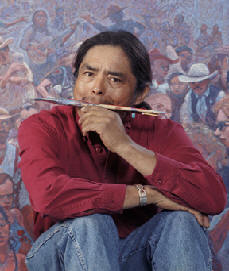As the summer comes to an end again, I feel that slight tint of autumn waiting upon the late summer air, waiting to gather up the sounds and colors of the season’s excitement.
There is a bit of residual sadness that I have learned to associate with this changing of season. For me, it has always been the time when you put away your carefree days and begin to prepare for the beginning of school. The ending and beginning sentiments are rooted in my government boarding school experiences. When the sunflowers’ heads began to droop, so did mine. Soon we would be back in the brutal institution with our young lives ruled by the Bureau of Indian Affairs and the bullies that ran the dormitory. This was the horror we faced each year at this time.
Our voices were lowered and sad glances exchanged as my aunt sewed buttons on shirts she made. The happy colors of summer were muted by the late and weaker light. The movements of the animals seemed heavier and the sounds edged in cries. Far off in the distance against the waning light, a slow moving dust devil danced and staggered into the windmill. The sky revealed nothing to me about rain or sandstorm. I tried to wrap my mind in hope, staring into the coming storm within the boarding school compound. Soon we left behind the organic landscape that nurtured our “Dineh-ness” for the geometric world that was created to change us.
The gentle and strong voices of my elders would be replaced by harsh, loud voices of overseers and abusive attendants. The sounds of shuffling moccasins on dirt floor were replaced by echoes of footsteps down sterile hallways coming to get us. The aroma of fresh tortilla and potatoes became a distant memory as it too was replaced by the smell of institution paint. Cold metal bunk beds took the place of my bedding of sheepskin. This was the deep sadness we encountered with each new school year. “<i>N’di yilli’ Bitsii’n’da he’s dsiid</i>”—“the sunflowers have lowered their heads,” my aunt would say.
This was also the time I did my chores with a deeper appreciation. Knowing that with my leaving much would be left unattended, I wanted to leave a mark of my having worked here. I wanted tangible remains of my sweat. Therefore, I split the biggest pile of firewood and carried water to the cornfield. I cleaned sheep intestine without flinching and greeted the animals in kindness. I sang with the elders with even greater conviction and sent forth longer prayers each morning. This sense of impending doom gave me a chance to go deeper into my own sanctity. We children bundled up that sacredness, our language, our faith and our stories in a safe place deep within. The space would be reopened in the time of corn planting. The school found this knowledge to be an obstacle to our transformation, but it sustained me throughout the school year. We would not be allowed to visit home until Christmas and then again next summer break.
The day we left for school arrived. Between the smell of soap and sage smudge were the cries of young children being separated from families for the first time. I remember the whining old Chevy my uncle Jack came around in to take us back to school. Quick hugs and brave smiles, we were on our way. With tearstained chapped brown faces, we headed into another year. “<i>Bi’ Na haa ghaa’ n’diil le</i>,”—“Go, my son. Go obtain their magic,” my father used to say.
The memory of summer and its stories stayed. Little boys huddled in stories of skinwalkers and horsebreaking was always comforting. Stories of someone’s brother going off to war somewhere. Someone’s grandfather passed on. A fight witnessed and bruises earned.
My autumn now is filled with hope and abundance. New canvases hold new visions. New shows and travels are ahead. This summer has yielded a healthy crop of corn. We sang in a Puberty Chant ceremony. I facilitated a youth art retreat out on the Rez. I released loved ones into eternity, and my birthplace called me home. The sunflowers still lower their heads, but now they are heavy with seeds of hope, rather than sadness.

